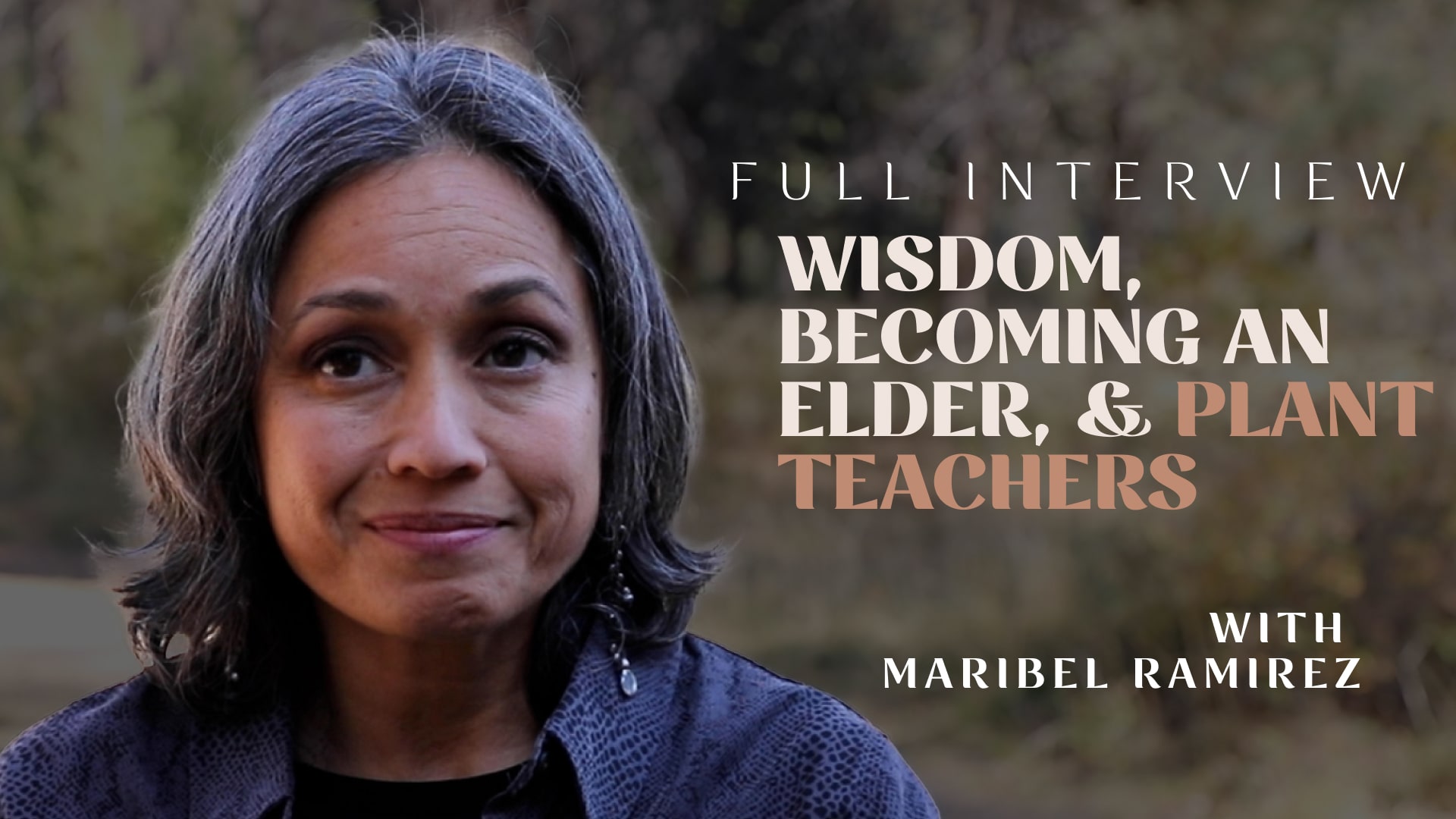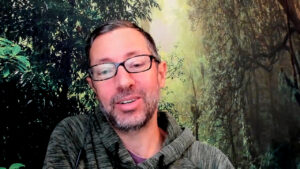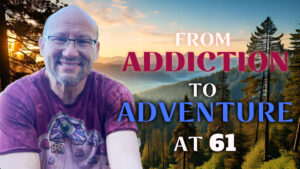Wisdom, Becoming an Elder, & Plant Teachers || Maribel Ramirez
Meet Maribel Ramirez
Maribel is a mental health/substance use counselor, healer, and body worker. Her lineage includes ancestors from the African continent, China, Indigenous ancestors from what is now Colombia in the South American Continent, and Spain. In this interview Maribel discusses wisdom, becoming an elder & plant teachers.
Maribel’s conventional education includes a Bachelor of Arts in Literature and a Master of Science in Mental Health Counseling. However, most of her learning has come from time spent in Nature, a well-worn Plant Medicine path with lineage curanderos from Peru, as well as Tibetan and Zen Buddhist teachings, and Hindu/Vedic Spiritual philosophy explored through the path of Yoga.
Maribel is the founder of Liberation Pathways, an organization with a mission to provide healing and wellness services to all people, but especially to marginalized and historically oppressed peoples. Liberation Pathways is located in the ancestral lands of the Cow Creek Umqua, Yoncalla, Kalapuyans, Southern Molalla, Upper Umpqua, and Quuiich tribes (Lower Umpqua).
Connect with Maribel on Instagram
Watch the recap of our interview with Maribel
Watch the full interview with Maribel Ramirez
How are the medical and the ceremonial models different when we talk about psychedelics?
Maribel
I think it’s wonderful that the medical model is starting to understand the value of how sacred medicine, sacred earth medicine and sacred plant medicines are important in our healing and are important in addressing our trauma.
We, as a culture, are carrying a lot of inter-generational and historical trauma, right now. So I don’t want to be redundant in trying to explain how important plant medicines are in healing this trauma that we’re carrying at so many levels.
The medical model is looking at plant medicines from that perspective of bringing the medicines into a laboratory, taking the medicines out of their sacred context and creating dosages and creating protocols and creating spaces that are removing the individual from community and bringing them into an office space, a therapeutic space, and working with that individual in that way.
This is not necessarily wrong. It can be helpful, as we have seen in all the studies that have been conducted now with certain medicines. But when we look at sacred plant medicines, we’re looking at a tradition that are thousands of years old from indigenous cultures.
In these indigenous contexts, the medicines are communed with in a ceremonial way. And healing happens in the community.
And healing also happens when these ceremonial spaces are held by lineage holders and indigenous people that hold generations upon generations of wisdom and knowledge in how to commune with these medicines and how to work with these medicines in the deepest way possible.
So when we look at the medical model, we are not necessarily honoring these indigenous ways of knowing and we’re excluding these indigenous ways of knowing and these indigenous ways of working with the medicines.
How have we come to a place where we do not respect our elders?
Maribel
That is such a huge question. But the one place that I can start is that most indigenous cultures around the world have what are known as initiations or rites of passage. So in these initiations there was a marked ritual experience that helped people transition from one developmental stage into another. The main one being from adolescence into adulthood. And during these rites of passage, human beings went down into the depths of soul, into some kind of metaphorical underworld and faced mortality. In facing this mortality, there was a dissolution of self.
And in that dissolution of self, they came back different and there was a village to receive them. And how they came back different is they came back with a knowledge of their gifts and their place in the world and their place in the village. We don’t have that as a culture.
We tried to destroy indigenous ways of knowing and we lost access to these rites of passage. For some of this has happened sooner for some of us it happened later.
So we have a lot of people who are masquerading as adults, but they have not necessarily undergone that initiation that would lead them into a maturity that would allow them to access their wisdom.
So we lack elders in our culture and in lacking elders, we have also become a culture that does not value aging, that fears aging, that fears death. And so I’m trying to bring it all in so that you could see how it’s interrelated. So when we are at death phobic and age phobic culture, we do not cultivate elder hood.
And when we don’t have elders to guide us, we are a culture that’s flailing. We are a culture that has no wisdom holders to turn to when we need direction and we need instruction. Right. And this all corresponds to the breaking down of a village, to the breaking down of a tribe. This all goes back to patriarchy and colonialism and the way that these ways were broken.
But we do have elders in our culture. We just have to find them. They are not readily accessible to us. They’re not part of our village or probably not part of our families. Some of us may have elders in our families if we’re lucky. But we do have to find them.
So Martin Luther King would have been an elder. Nelson Mandela was an elder. Mother Teresa was an elder. Mahatma Gandhi was an elder. We have elders now. Martin Prechtel is an elder. Michael Mead is an elder. James Baldwin was an elder. The Dalai Lama is an elder.
So we have to go to these teachers and it’s not just a matter of watching a YouTube video. We have to dive into their writings, dive into their teachings, dive in to what they were bringing and really learning as much as we can and finding our way into elder hood, finding our own way into initiation, because there’s no village to initiate us.
And so how do we dive into our own initiation? we look at the experiences, the dark experiences, the difficult experiences, and figure out how to mine the gold.
How to grow from these experiences and how to let them transform us. That’s one way. And another way is plant medicine.
Plant medicine are elders, They are guides. As we descend into the darkness of our soul and we come back, different, changed, transformed.
Do elders naturally take on more responsibility?
Maribel
Absolutely. This is so correct. I think when somebody starts walking into that threshold of elder hood, one of the ways one of the things that happens is capacity increases, right?
As wisdom increases, capacity increases. And the call of the soul becomes very clear. And so when the elder starts listening to the call of the soul, they automatically start contributing more to the world, more and more into the world.
And so we can look at the elders in our culture and we can see how much they’re holding and how much they’re bringing. And it almost looks superhuman. And as we start walking this path ourselves, we’ll see that capacity increasing within us as a means of the soul telling us what we need to contribute to the world, what we’re here for, meaning and purpose, which is a beautiful thing.
Of all human beings, we’re able to tap into what their meaning and their purpose and their role for humanity is. We would be in a very different situation as a species.
Can you talk about decriminalization versus legalization specifically with ceremonial use?
So I voted for Measure 109. As a therapist, I thought it was a step forward. I thought, my goodness, this is amazing. We’re starting to recognize the importance of plant medicines in our healing, as I mentioned before. And so as I started diving deeper into Measure 109 and attending the Oregon Health Authority meetings, I started to realize that Measure 109 was not going to allow for ceremonial use.
Ceremonial means of communing with the medicines. I also realized that therapeutic use was not in alignment with ancestral ways of knowing. I’m learning from a Mayan Toltec abuela at the moment, whose name is Cardozo Castillos, and he has been very clear in explaining how these therapeutic uses are not necessarily wrong. You know, they can be helpful, but they’re only part of what is possible.
And so that’s when I started realizing, realizing that there’s a problem. I had somebody from the Oregon Health Authority contact me explaining that there were no indigenous voices at the table when they were creating these protocols and these, you know, the outline for the measures. Right. And I said, no problem.
I can get indigenous voices at the table. And we actually did set up a meeting and the abuela came and he spoke to them. But if Maria Sabina came to the United States right now, if she came back from the dead and she came to the United States right now, she would not be able to serve the medicines. And that is the problem. So these sacred ways of knowing are the knowing and the wisdom that comes from indigenous peoples.
When we look at what we’ve done through colonization, we have decided that only one way of knowing is correct. Only one way of knowing is correct. And that’s the knowing of the evidence based practice and the knowing of science and the knowing of Christianity even. And the knowing of the patriarchy and the knowing of capitalism and the knowing of colonialism.
Whereas there’s thousands of years of ancestral knowing that comes from indigenous cultures who lived not in perfection, but in harmony with their environment for thousands of years. And at some point we were all indigenous. At some point Europe was indigenous. Then we had these systems come in and break those ways of knowing.
As soon as those ways of knowing were broken, the disconnection from the earth and the cycles of nature and all of that started happening, the destruction came and that destruction was brought back here to the Americas and we can see the results of it now.



